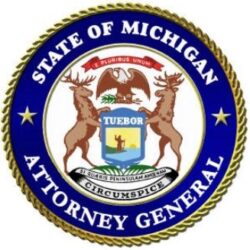
AG Shifts Focus to Care Facilities Violating Executive Orders

Media Contact: Ryan Jarvi FOR IMMEDIATE RELEASE: AG Nessel Shifts Focus to Long-term Care Facilities Violating Executive OrdersLANSING – To make sure long-term care facilities are operating within the requirements of law during the COVID-19 pandemic, Michigan Attorney General Dana Nessel’s office is ramping up efforts to enforce Gov. Gretchen Whitmer’s executive order that provides rules and procedures those Executive Order 2020-148 outlines protections for residents at long-term care facilities, like barring their evictions for nonpayment, and lists several Among other requirements under the executive order, long-term care facilities must cancel communal dining and group activities, implement disinfection and sanitation regimens, provide personal protective equipment to employees, inform employees of a COVID-19-positive patient, and report presumed positive cases and additional data to their local health departments and the Michigan Department of Health and Human Services (MDHHS). Willful violations of this executive order are considered a misdemeanor offense, which carry a $500 fine and/or 90 days in jail. “Over the last several months, this virus has claimed more than 6,000 lives in Michigan and presented us with countless challenges that we have had to work together to overcome,” Nessel said. “My office is prepared to continue our role of enforcing the law as this virus lingers and as Michigan’s most vulnerable populations remain at risk. The measures outlined in Executive Order 2020-148 to protect those vulnerable populations and the people who care for them must be followed.” The Attorney General’s Health Care Fraud Division receives federal funding to investigate and prosecute alleged abuse and neglect of residents of long-term care facilities, including taking legal actions to address violations of this executive order. However, the division may only act in response to a formal complaint. The division has been working with the Michigan Department of Licensing and Regulatory Affairs (LARA) to review reports of executive order violations since the orders were issued. Responses to those reports thus far have been handled through education and outreach measures, rather than the pursuit of criminal charges. However, the Attorney General’s office is prepared to take legal action if necessary. Details about ongoing investigations will not be released. The enforcement of Executive Order 2020-148 at long-term care facilities is a coordinated effort among the Attorney General’s office, MDHHS and LARA, which maintains regulatory oversight of these facilities. It’s also supported by Gov. Gretchen Whitmer. “Across Michigan, nursing home staff, residents, and their families have made unprecedented sacrifices over the past four months to protect each other from the spread of COVID-19,” said Gov. Whitmer. “Their work has undoubtedly saved lives. However, if there are facilities in our state that are putting their residents and staff at risk by not following the rules, they must be held accountable. I’m grateful that the Attorney General is prepared to take action to ensure every long-term care facility is doing everything they can to slow the spread of COVID-19 and protect our most vulnerable residents.” As of Monday, Michigan has recorded more than 2,000 resident deaths in long-term care facilities that have resulted from COVID-19 exposure, with around 7,800 positive COVID-19 cases emanating from people residing in those facilities. There have also been 22 deaths of staff members at long-term care facilities and more than 3,700 infected. “Our staff works with the employees and owners of Michigan’s long-term care facilities day in and day out and while I’m confident that the vast majority of them are doing things the right way, it is vital that we take action against those who are not following the rules,” said LARA Director Orlene Hawks. “I appreciate AG Nessel and her team in leading the efforts for consumers to file complaints on possible violations related to the EO violations and spread of COVID-19 in long-term care facilities.” As part of the concerted effort, LARA will refer complaints it receives involving violations of the various safety protocols outlined in EO 2020-148 to the Attorney General’s Health Care Fraud Division, which will review the complaint and determine whether additional steps must be taken, such as seeking more information from the facility, launching a formal investigation or taking action in the courts. The Department of Attorney General’s Health Care Fraud Division has jurisdiction to investigate claims of abuse and neglect in long-term care facilities. Violations can be reported by calling the Attorney General’s Health Care Fraud Division at 800-24-ABUSE (800-242-2873) or filing a complaint online. |







 Refrigerators, tires, old cars, barrels with mysterious contents and an entire body cast are among the strange things pulled out of the woods by Adopt-a-Forest volunteers in the program’s nearly 30-year history.
Refrigerators, tires, old cars, barrels with mysterious contents and an entire body cast are among the strange things pulled out of the woods by Adopt-a-Forest volunteers in the program’s nearly 30-year history.
 Cleanups make a real impact on Michigan’s landscape: 22,000 pickup loads of trash have been removed from forests since the program went statewide in 1991, with about half of those materials able to be recycled.
Cleanups make a real impact on Michigan’s landscape: 22,000 pickup loads of trash have been removed from forests since the program went statewide in 1991, with about half of those materials able to be recycled.